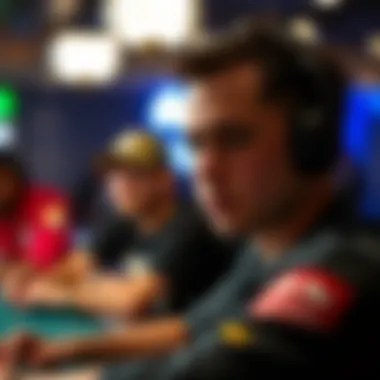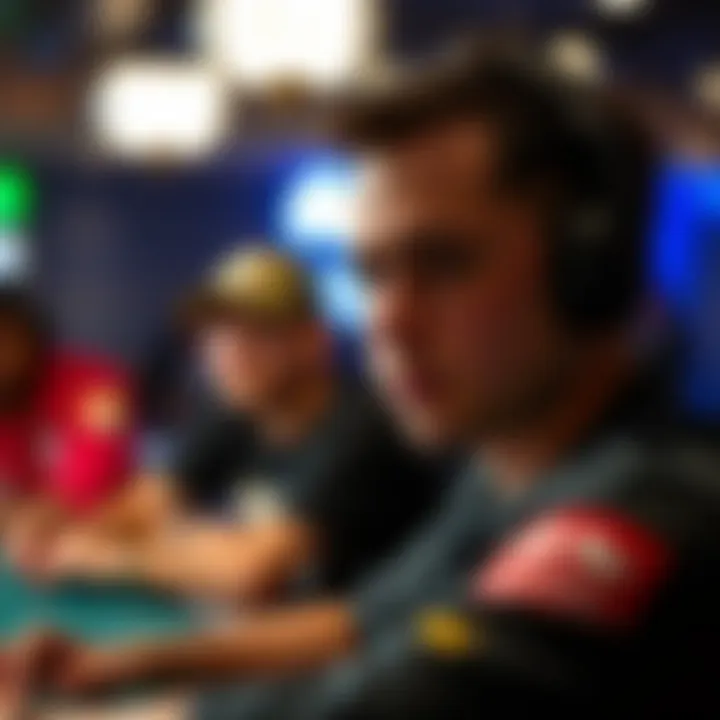The Billion Dollar Bracket Challenge: Insights from 2021


Intro
The world of sports gambling has seen dramatic shifts over the years, not least highlighted by events like the Billion Dollar Bracket Challenge. Launched in 2021, this audacious undertaking gave sports fans an opportunity to gamble on NCAA basketball tournament brackets with staggering stakes. It’s not just about filling out a sheet with team names; it’s an intricate game of strategy where every pick can mean the difference between cashing big or going home empty-handed.
In this analysis, we’ll peel back the layers of this challenge, exploring its roots and examining how the structure invites not only seasoned gamblers but also a wave of casual participants. The implications of high-stakes betting extend far beyond individual outcomes— they can reshape the gambling landscape and influence broader society. From the understanding of betting odds to demographics of participants, each layer offers a glimpse into the realities and complexities faced by both the novice and the professional gambler.
As we move forward, we will navigate crucial betting strategies that may prove beneficial for participants. Along the way, we will dissect various types of betting systems, looking into what has worked successfully in the past and what strategies may help set gamblers apart from the crowd.
Intro to the Billion Dollar Bracket Challenge
The Billion Dollar Bracket Challenge stands as a pivotal event in the landscape of sports betting, capturing the attention of many individuals across various demographics. In a world where gambling intertwines with entertainment, this challenge has sparked interest not only amongst avid sports fans but also casual viewers, making it a cultural phenomenon. At its core, the challenge offers a hefty prize for those who can correctly predict the outcomes of NCAA basketball tournament games. This premise is both simple and ingenious, creating a thrilling atmosphere that draws in participants from all walks of life.
The rising trends in online gaming and the accessibility of betting apps have set the stage for what has become a multi-million-dollar spectacle. The annual frenzy surrounding March Madness drives participants to partake in bracket challenges, with the Billion Dollar Challenge touted as the pinnacle. Understanding the nuances of this contest is crucial not just for potential participants but also for observers interested in the implications it has on the broader gambling industry.
This article will navigate through the historical context and the objectives that underlie this riveting challenge, revealing layers of complexity and competitive spirit that define the experience of participants.
Historical Context
The roots of the Billion Dollar Bracket Challenge can be traced back to a confluence of evolving digital platforms and the increasing popularity of college basketball. Conceptually, it builds on traditional betting practices that have existed for decades but propels them into the digital age. The first iteration of this challenge appeared in 2014, initiated by a major tech company aiming to blend the intensity of sports with the thrill of high-stakes betting.
As sports betting gained legitimacy and popularity through legislative changes, particularly in the United States, this challenge acted as a catalyst. It fostered a new environment, one where sports enthusiasts felt empowered to engage more deeply, turning passive viewership into active participation. Hence, while the contest primarily revolves around predicting outcomes, it's also a reflection of how society's approach to betting and competition has transformed over the years.
Objective of the Challenge
The primary goal of the Billion Dollar Bracket Challenge is straightforward: to encourage participation through the allure of a monumental cash prize. However, it serves several underlying objectives that enrich the experience.
- Engagement through Competition: By creating a funnel for both amateur and seasoned bettors, it levels the playing field, allowing anyone to join the fun irrespective of their prior knowledge.
- Promotion of Basketball Culture: This challenge aims to enhance interest in NCAA tournaments, instilling a sense of community among fans and participants alike.
- Data Collection and Analysis: Companies involved gather substantial data regarding participant behaviors, preferences, and trends, which can be crucial for future marketing strategies and product development.
"The Billion Dollar Bracket Challenge contrasts the age-old culture of sports betting with modern advancements in technology, marrying them in a unique way that reflects current societal trends."
In summary, the objective extends well beyond monetary incentives, aligning with broader trends in sports engagement and emphasizing community interaction through a shared passion for basketball. In the next sections, we will explore the intricate structure that underpins the challenge, shedding light on how these foundations facilitate the competition’s explosive growth.
Structure of the Challenge
Understanding the structure of the 2021 Billion Dollar Bracket Challenge is pivotal for grasping the nuances surrounding high-stakes betting in sports. This section outlines the framework within which participants engaged and strategized, offering insights that can fuel both analysis and participation in future iterations of such challenges.
Entry Fee and Prize Pool
The financial backbone of any contest, particularly one as grand as this, rests on the entry fee and the prize pool. In 2021, the challenge welcomed participants with a modest entry fee that was significantly lower than the potential windfall awaiting the winners. The entry fee was $1 per bracket, a low threshold that encouraged a wide array of participants, from casual fans to hardened gamblers.
The prize pool for the Billion Dollar Bracket Challenge was staggering, with the grand prize set at $1 billion for a perfect bracket—a feat that is statistically improbable given the complexities involved in predicting the outcomes of the NCAA tournament. Participants were drawn in not just by the billion-dollar prize but by various smaller prizes awarded for being among the top predictors in different rounds. The allure of hefty rewards with minimal investment created a vibrant competitive landscape where many sought their chance at life-changing money.
"A $1 entry for a shot at a billion captures the imagination. It’s the stuff dreams are made of."
This setup not only amplified participant enthusiasm but also sparked intense discussions on platforms like Reddit and Facebook regarding effective strategies, potential pitfalls, and the role of luck versus skill in bracket creation. The accessibility of such a challenge—in financial terms—has opened doors for diverse participants, allowing them to engage in a high-octane betting environment without being completely shut out by hefty fees.
Eligibility Criteria
Eligibility criteria form a crucial part of the structural integrity of the 2021 challenge. Open to anyone aged 18 years and older, the challenge sought to include as many enthusiastic predictors as possible. This inclusivity fostered a community of diverse voices and backgrounds, enhancing the overall experience.
Key eligibility aspects included:
- Age Requirement: Contestants had to be at least 18, ensuring compliance with gambling regulations across various jurisdictions.
- Registration: Participants were required to create an account with the hosting platform, providing basic personal information to verify their eligibility.
- Geographic Restrictions: While broadly accessible, certain locations had restrictions based on local gambling laws. Individuals residing in states that prohibited such betting activities were precluded from participating.
The straightforward criteria further contributed to the massive turnout. Many who might not typically engage in gambling found themselves swept into the excitement of the challenge. Additionally, the social aspect of sharing brackets and discussing strategies with friends or on social media added a layer of community engagement that enhanced the entire experience.
This careful structuring of entry fees and eligibility ensured that the challenge was both enticing and compliant with regulations, setting the stage for an exhilarating year in the world of sports betting.


Participation Trends
Exploring participation trends in the Billion Dollar Bracket Challenge opens a window into not just the numbers, but the very nature of who engages in high-stakes betting. Understanding these trends is crucial for both marketers aiming to attract more players and analysts seeking to comprehend the competitive landscape. Every entry tells a story of motivation, strategy, and the subtle influences that shape decision-making processes within this fascinating realm.
Demographics of Participants
Analyzing the demographics of participants is like piecing together a jigsaw puzzle. Each piece adds clarity to the larger picture of who is flocking to these challenges. The population engaging in the Billion Dollar Bracket Challenge is incredibly diverse. It includes young college students betting their pizza money, middle-aged professionals just looking for a little excitement, and seasoned gamblers with a keen eye on statistics.
Several studies indicate that age plays a significant role in who participates. Amateur bettors typically range in age from 18 to 35, drawn in by the thrill and social aspect of March Madness. On the other hand, older participants often approach the challenge with a different mindset, using their knowledge accumulated over years of experience in sports betting.
Gender also plays a role; though historically, the majority of participants have been male, recent trends show a notable increase in female bettors. This shift can be attributed to the growing recognition of women's involvement in sports and increased marketing efforts targeting a broader audience.
"The landscape of sports betting is changing rapidly, with participants resembling the diversity of the sports themselves."
Interestingly, income levels vary greatly too. Many participants enter the competition at a modest entry fee, while others are willing to stake larger amounts, especially when enticed by the potential for massive payouts. This highlights how motivation may differ; some players simply enjoy the game, while others are driven by the prospect of financial gain.
Growth in Participant Numbers
The 2021 edition of the Billion Dollar Bracket Challenge witnessed an exponential growth in participant numbers, making it a subject of keen interest. Various factors contributed to this surge, including the increased accessibility of online platforms and the lingering effects of the pandemic, which shifted many people's attention towards home-based entertainment.
- Online Engagement: With many sports leagues halted or delayed in 2020, bettors craved competition. The launch of the 2021 challenge coincided with a widespread return to sporting events, reigniting excitement. This duality of condition allowed participants to dive back in with fervor.
- Marketing Efforts: Heavy promotions from major betting organizations played a pivotal role in attracting newcomers. Distinct social media campaigns targeted both traditional fans and newcomers, utilizing platforms like Facebook and Reddit to echo the challenge’s lure.
- Increased Legitimacy: With more states legalizing sports betting, a newfound sense of legitimacy surrounded participation. Many individuals became more comfortable participating in bracket challenges, seeing it as a legitimate avenue of entertainment rather than a mere gamble.
The number of participants reached new heights, with some estimates suggesting upwards of 20 million people entered the challenge in 2021. This substantial increase not only reflects the challenge's popularity but also cements its place in the conversations surrounding sports gambling.
Understanding these trends provides pivotal insights into shifting behavior patterns in the gambling world, which ultimately shapes marketing strategies, technological advancements, and overall industry standards in the continuing evolution of high-stakes betting.
Strategies Employed by Contestants
The high stakes of the Billion Dollar Bracket Challenge in 2021 drew an eclectic mix of participants, each bringing their own flair and style to the game. Understanding the strategies they employed not only reveals the mindset of the players but also gives insight into the broader arena of sports betting and competition. Analyzing these tactics can provide a competitive edge for future contestants and enthusiasts alike.
Analytical Approaches
When it comes to the billion-dollar brackets, raw luck plays a part, no doubt. But seasoned participants delve deep into analytical methods to tip the scales in their favor. The numbers speak for themselves – or at least they should if one knows how to interpret them.
- Data-Driven Decision Making: Many contestants harness statistical analysis to drive their selections. By examining team histories, player performances, and matchup statistics, they aim to forecast potential outcomes more accurately. For instance, someone scrutinizing the performance matrices might uncover that specific teams perform significantly better in the first round, a nugget of wisdom that can shape their choices.
- Algorithm Utilization: Some participants took it a step further and created algorithms to model outcomes based on real-time data feeds and historical trends. This scientific angle goes beyond just casual predictions; it involves crafting a system that learns from each iteration of the challenge. By inputting various parameters, they can generate a shortlist of viable candidates for advancing rounds.
"To win big, one must blend intuition with calculation; it’s a dance of numbers and instinct. The right algorithm may just be your golden ticket."
Psychological Factors in Decision Making
The mind plays a pivotal role in the choices made during the Billion Dollar Bracket Challenge. Contrary to what one might think, decisions aren’t always extrapolated strictly from data. Psychological factors deeply intertwine with the analytical approaches, creating a complex tapestry of influences.
- Cognitive Biases: Participants often battle their own biases. A classic example is the confirmation bias, where one might favor teams they have emotional ties to, despite contrary statistical evidence. Recognizing this bias can be a game-changer.
- Risk Perception: The thrill of wagering can cloud judgment. Many contestants tend to overestimate their risk tolerance, leading to bets that might not align with sound strategies. An emotional investment can skew perception, pushing participants towards unlikely bets.
- Social Influences: The chatter around brackets, especially in peer networks, can sway opinions significantly. Groupthink can lead individuals to make decisions that diverge from their own intuitive analysis. It’s important to remember that sometimes, stepping back from the crowd is essential to maintaining objectivity.
In summary, both analytical approaches and psychological factors are crucial in shaping the tactics of contestants. These strategies are not just about crunching numbers; they involve understanding one's own mental framework and how it interacts with the surrounding betting culture.
For more insights into behavioral economics and sports betting, resources like Wikipedia, Britannica, and the gambling forums on Reddit offer a wealth of information.
The Role of Technology
The impact of technology on the Billion Dollar Bracket Challenge cannot be overstated. As the challenge gained significant traction in 2021, various technological advances played an integral role in shaping participants’ experiences and betting strategies. Important elements like online platforms, data analytics, and mobile access have widened participation while enhancing strategic opportunities. With growing attention on sports betting legality and technology interfacing seamlessly with gambling, understanding this link is crucial.
Online Platforms and Tools
In 2021, online platforms became the hub for bracket-making and betting, leveraging user-friendly interfaces and social connectivity. These environments attracted millions who might not have otherwise considered getting involved in high-stakes wagering. For instance, sites like Yahoo Sports and ESPN provided easy navigation for creating brackets while enabling sharing statistics with friends, enhancing engagement.
Moreover, innovations like mobile applications allowed participants to make real-time updates to their brackets. This adaptability ensured that as games progressed, bettors could seize opportunities based on the latest information or unforeseen outcomes. Various tools are available:
- Bracket Creation Tools: Simplifies setting up individual or group brackets.
- Live Updates and Notifications: Keeps players informed on the outcomes affecting their bets.
- Social Integration: Lets users challenge friends or share results, which builds community around the challenge.


Technology’s influence extends beyond interaction. It levels the playing field for novice participants, who now have access to sophisticated resources previously reserved for experienced gamblers. This democratization has fostered an environment where everyone can participate, irrespective of their betting acumen.
Data Analytics in Betting
Data analytics has become a cornerstone in sports betting, especially during events like the Billion Dollar Bracket Challenge. Contestants increasingly rely on comprehensive datasets to enhance their decision-making processes. Analyzing statistics, player performance, team histories, and injuries offers an edge that might tip the scales in one’s favor. Key elements to consider include:
- Statistical Modeling: Data scientists utilize models that predict outcomes based on past performances.
- Trend Analysis: Participants evaluate historical data trends to inform their predictions.
- Machine Learning: Advanced algorithms learning from data patterns assist in refining predictions.
In 2021, numerous bettors utilized these analytics techniques, showcasing a shift from gut feelings to calculated risks. The importance of understanding utility in gambling cannot be emphasized enough. Knowing which data points significantly affect outcomes allows players to manage risks and potential rewards effectively, ultimately fostering better decision-making.
"The use of data analytics in betting transforms uncertainty into informed choices."
The increasing reliance on technology and analytics shows a profound shift in gambling culture. As technology evolves, so too will the methods and strategies that participants employ in the ever-competitive realm of bracket betting.
Challenges and Controversies
The Billion Dollar Bracket Challenge is not just a high-stakes competition among sports enthusiasts; it's a melting pot of excitement, strategy, and, inevitably, a slew of challenges and controversies. Understanding these elements is crucial for contestants, organizers, and stakeholders involved in the rapidly evolving landscape of sports betting.
The spotlight here shines on two main areas: fraud prevention and security measures, along with the legal and ethical considerations surrounding such a massive gamble. Both aspects are entwined with the integrity of the challenge and the security it promises to participants.
Fraud Prevention and Security Measures
Fraud has a sneaky way of creeping into large competitions like the Billion Dollar Bracket Challenge. With millions of dollars on the line, the temptation for dishonesty is palpable. To mitigate this risk, organizers must implement robust security measures. One crucial element is the technology used to safeguard participant data and ensure fair play.
- Verification Processes: Ensuring all participants have a legitimate entry is paramount. Robust verification methods—like identity checks and age restrictions—are applied to keep the game legitimate.
- Transaction Security: The use of secure payment gateways helps protect sensitive financial information, reducing the risk of fraud. For instance, platforms might employ encryption protocols that protect user transactions from would-be hackers.
- Monitoring Patterns: Employing advanced algorithms can help detect unusual betting patterns that signal potential cheating. Organizers often keep an eagle eye on these trends to ensure fairness in the challenge.
In the world of bracket competitions, trust is not just a nicety; it’s a necessity. Participants need confidence that the challenge is fair and that measures are in place to catch any attempts at fraud before they spiral out of control.
Legal and Ethical Considerations
The legal landscape surrounding such high-stakes betting is as tricky as walking a tightrope. Each jurisdiction may have different rules and regulations regarding gambling, which complicates matters for organizers and participants alike. Being aware of local laws is crucial for anyone wanting to dip their toes into the waters of bracket betting.
- Local Regulations: Depending on where participants reside, the legality of entering such competitions can vary. Some states or countries may have stringent laws against online gambling, while others are more permissive.
- Age Restrictions: Most challenges set a minimum age requirement to participate in betting activities. This is crucial for protecting younger individuals from engaging in gambling activities before they are legally allowed to do so.
- Ethical Considerations: Ethical concerns hinge on the manipulation of outcomes. Participants often face temptation to gain an unfair advantage, which can lead to public skepticism about the validity of the competition. Organizers must remain transparent in their processes to uphold the ethical integrity of the challenge.
"The intersection of legality and ethics within gambling challenges can be murky at best, pushing organizers to exercise unprecedented diligence in maintaining their challenge's integrity."
Ultimately, the challenges and controversies surrounding the Billion Dollar Bracket Challenge reflect broader issues that exist within the gambling industry. By analyzing these aspects, we gain a wider understanding of how high-stakes competitions must navigate their skeletons in the closet, ensuring a seamless experience for those willing to take the plunge into grand bets.
Impact on the Gambling Industry
The Billion Dollar Bracket Challenge of 2021 holds significant sway over the gambling landscape, impacting it in ways that reach far beyond a mere contest. Its sheer scale not only captures the imaginations of participants but also reshapes legislative frameworks and encourages the proliferation of similar betting events. The challenge has become a bellwether for the future of sports gambling and online betting.
Influence on Sports Betting Legislation
The influence of the Billion Dollar Bracket Challenge extends deeply into sports betting legislation. As more individuals flocked to participate in the challenge, regulatory bodies began to take notice of the revenue potential tied to such high-profile betting events. Lawmakers are increasingly confronted with the question of whether to embrace or regulate the burgeoning field of online gaming. In several states, the challenge's popularity has propelled discussions on revising existing gambling laws to accommodate sports betting and bracket challenges.
Moreover, the event has led to a greater push for standardized regulations across state lines, aiming to maintain fair play while capturing tax revenues. With states like New Jersey and Pennsylvania leading the charge, many have moved to create a legal framework that permits the kind of betting practices popularized by the challenge.
"The Billion Dollar Bracket Challenge isn't just a game; it's a driving force for change in how we approach sports gambling on both state and federal levels."
Emergence of Similar Challenges
The success of the Billion Dollar Bracket Challenge in 2021 has sparked a creativity explosion among operators and entrepreneurs in the gambling industry. With its colossal prize and wide-reaching appeal, many entities have sought to ride the coattails of this challenge, launching their own versions. These emerging challenges vary in format and prize structure but share the core elements of competition and excitement.
New platforms have emerged that combine the thrill of bracket betting with social features. These platforms offer more than just financial rewards; they create communities around shared interests. Participants often find themselves engaging in discussions and forming alliances that deepen the experience. Social media is abuzz with the buzz of these challenges, with various platforms experiencing a surge in user engagement as fans and gamblers alike join in on the action.
Concerns still loom about the long-term sustainability of these challenges. Will they become mere flash-in-the-pan events, or will they take root in the culture of sports betting? Many in the industry are ardently watching the evolution of these new contests, poised to adapt their strategies to accommodate the new norm.
In summary, the impact of the Billion Dollar Bracket Challenge on the gambling industry is profound. It has catalyzed legislative change and ignited a series of similar betting events, which may very well redefine the landscape of sports gambling for years to come. Keeping an eye on these developments is essential for gamblers, marketers, and analysts alike as they navigate this rich and shifting terrain.


Case Studies of Notable Participants
The landscape of high-stakes betting is often shaped by the stories of individuals who partake in these challenges. The Billion Dollar Bracket Challenge is no exception; the experiences, strategies, and outcomes of notable participants provide invaluable insights into the intricacies of gambling behavior. By exploring these case studies, we glean an understanding of what drives contestants not only to succeed but also to stumble. These narratives help illuminate the psychological and economic factors at play, making it clear this event is more than just a numbers game.
Insights from Successful Contestants
Successful contestants in the Billion Dollar Bracket Challenge often have a few things in common. They do their research, analyze trends, and employ strategic methods that differentiate them from the average participant.
- Data Mastery: Many winners recognize the utility of leveraging data. For instance, one participant, a data analyst, meticulously examined each team's performance metrics, injury reports, and even historical match-up data. By collating this information, they crafted brackets that held strong predictive power.
- Psychological Edge: Winning participants tend to understand the importance of mental fortitude. One standout story involves a contestant who entered the challenge with the mindset of being relaxed and focused rather than overwhelmed by the stakes. They likened their approach to a poker game, understanding that nerves could cloud their judgment. This psychological clarity allowed them to make calculated decisions based on logic rather than emotion.
- Community Engagement: Another notable winner emphasized the importance of discussing predictions within groups. They engaged with online communities and forums, where collective insights can often reveal overlooked aspects. This exchange of ideas presented a more comprehensive view of the betting landscape, ultimately giving them an advantage in crafting their winning brackets.
"Success isn't simply about knowing the stats; it's about understanding the story each game tells, using all available tools and insights."
Lessons from Failed Attempts
Not all participants in the Billion Dollar Bracket Challenge find success, and examining the experiences of those who fell short provides equally potent insights. Understanding their missteps can be just as illuminating as studying the victors.
- Overconfidence: A common pitfall for many participants is overestimating their knowledge. One contestant famously declared their bracket to be flawless after a robust initial strategy, only to see their projections crumble as surprise upsets unfolded. This serves as a cautionary tale, highlighting the need for humility when it comes to predictions.
- Ignoring the Fundamentals: Some players became too enthralled by dazzling statistics, neglecting fundamental team dynamics such as coaching strategies or player morale. By focusing too heavily on hard numbers, they missed out on qualitative factors that can significantly influence outcomes.
- Failure to Adapt: As tournaments evolve, so should the strategies used by participants. One individual stubbornly stuck to their initial bracket choices, even after significant injuries and other impactful developments. This rigidity ultimately hindered their chances, showing how adaptability is crucial in the fast-paced world of sports betting.
The case studies of notable participants in the Billion Dollar Bracket Challenge reveal a tapestry of lessons—both from success and failure. They highlight the importance of comprehensive research, psychological resilience, and adaptability, underscoring the complexities of betting and the strategies that turn dreams of winning into tangible outcomes.
Behavioral Economics in Bracket Betting
Behavioral economics provides crucial insights into how participants approach the Billion Dollar Bracket Challenge. It looks at the factors influencing decision-making and the psychology behind betting strategies. Understanding these behaviors can significantly enhance a gambler's experience and outcomes. The nuances of how individuals assess risk, perceive value, and make choices can redefine their engagement with such high-stakes competitions.
Risk Assessment and Management
In any betting context, risk assessment is vital. When individuals participate in a bracket challenge, they often weigh potential rewards against the risk of loss. Here are some key factors they consider:
- Historical Performance: Participants frequently review past performance of teams to inform their predictions. A seasoned bettor may look at how teams have performed in previous tournaments or recent games.
- Injury Reports: Keeping an eye on player injuries can sway betting decisions significantly. A star player missing from the lineup may lead to beliefs that a team’s chance of winning is greatly diminished.
- Betting Odds: These odds are not just random figures; they react to public sentiment and expert analysis. Participants often find themselves adjusting their bracket choices based on these shifting landscapes.
An interesting observation is that many contestants fall prey to cognitive biases, such as overconfidence. Some bettors might feel certain about specific outcomes based on a hunch, disregarding statistical evidence. They might think, "This underdog has shown heart before, they can do it again!" This can lead to poor choices that ultimately affect their brackets negatively.
Understanding Utility in Gambling
Utility, in this context, refers to the satisfaction or joy a player receives from winning, set against the context of their investment. It’s not just about the monetary prize but the experience that the challenge provides. Behavioral economists argue that individuals often derive more utility from the thrill of the game rather than merely from the expected value of their bets.
A few components influence how utility is perceived in gambling:
- Emotional Investment: The emotional engagement in the challenge can be profound. Winning a bracket brings not just financial gain but also a sense of achievement and validation.
- Community Enjoyment: Many participants engage in bracket challenges not only for the prize but also to connect with others – friends, colleagues, or even online communities like those on Reddit. This social interaction amplifies the enjoyment factor, driving deeper involvement.
- Outcome Influence: Bettors might feel satisfaction even from a close call. For instance, if a team they supported almost wins but does not, they might still appreciate the excitement of the competition they witnessed.
In summary, the principles of behavioral economics play a decisive role in shaping how participants engage with bracket challenges. By understanding risk and utility, bettors may enhance their strategies and experiences, while also contributing to the larger dynamics of sports betting.
The End: Reflections on the Challenge
In examining the Billion Dollar Bracket Challenge of 2021, it's crucial to pause and reflect on what this phenomenon signifies in the landscape of sports betting. The challenge encapsulates a mix of excitement and uncertainty, drawing enthusiasts from diverse backgrounds into a high-stakes game that blends analytical prowess with sheer luck. Throughout this detailed analysis, we uncover not only the mechanics of the challenge but also its sociocultural influence and economic implications.
The impact of the 2021 bracket challenge extends beyond the financial stakes, as it also serves as a social event, bringing people together. Friends, families, and colleagues gather to share in the thrill of predicting outcomes, creating bonds and fostering connections through this shared interest. The experience is not merely about the potential monetary gain; it's about the narratives we build around teams and players, making sports more relatable and engaging.
Final Thoughts on the Experience
The 2021 iteration of the challenge stood out for numerous reasons. The participation numbers soared, reflecting a growing interest in bracket betting. This year saw a mix of seasoned bettors alongside novices, each with their unique strategies and motivations. For many, it was a chance to test their theories against the unpredictability of sports.
As we delve deeper into the responses from participants, it's evident that emotional connections to teams played a significant role in their decision-making processes. The passion for their chosen teams often eclipsed the cold, hard stats that guided more analytical contestants. This emotional tie adds a fascinating layer to the challenge, highlighting how gambling behavior is not solely driven by logic but by personal narratives and community ties.
Furthermore, notable successes and failures of participants have provided rich case studies. It has allowed us to dissect the varying approaches utilized, revealing a spectrum of strategic betting practices rooted in personal philosophy. For instance, some participants adhered strictly to mathematical predictions, while others leaned heavily on intuition and past experiences. Each participant’s journey through the tournament was a testament to the unpredictable nature of brackets and the thrill of competition.
Future of Bracket Challenges
Looking ahead, the realm of bracket challenges is poised for growth and evolution. With technology continuously reshaping how we engage with sports, platforms are likely to introduce more innovative features. Enhanced analytics tools and integrated mobile applications can offer real-time updates and insights, making it easier for participants to adjust their strategies mid-tournament.
Moreover, we can expect legal and regulatory frameworks around sports betting to evolve, creating new opportunities for bracket challenges to flourish. As states continue to broaden their stances on gambling, this could lead to increased competition among platforms and more enticing offerings for participants.
The future may also bring more gamification elements, further engaging a variety of participants. From incorporating social media aspects, such as sharing successes and failures in real-time, to enhanced features like live betting during games, organizers will likely seek to create a more immersive experience for bettors.
Ultimately, the Billion Dollar Bracket Challenge is a reflection of evolving social dynamics and the inherent human attraction to risk-taking. It offers an enriching blend of competition, analysis, and community engagement, making it a staple in the ever-growing world of sports betting.







